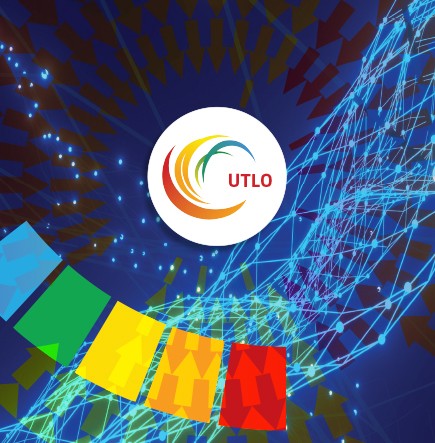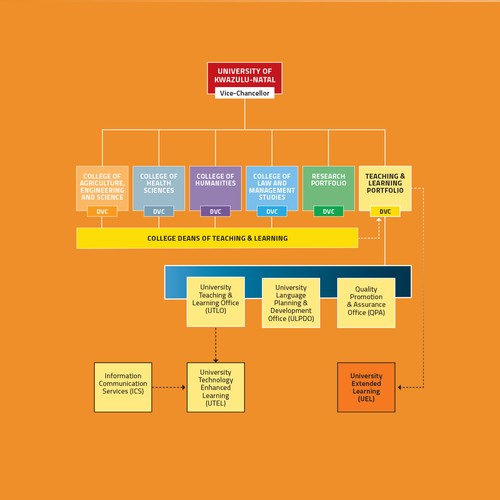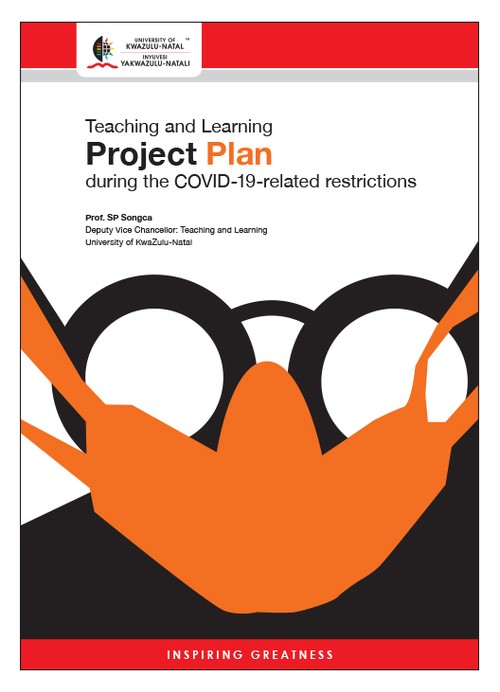The Quality Promotion and Assurance (QPA) office aligns its operations with the national imperative of promoting transformation in the Higher Education sector and the University’s vision and strategic goals. To support the key Institutional initiatives in UKZN’s Strategic Plan, QPA aligns its activities in the following broad areas: qualifications, programmes and short courses, quality reviews and accreditation by professional bodies, student and peer evaluation and institutional research.
Qualifications, Programmes and Short Courses
The QPA office guides and supports programme developers in the development of new programmes as well as changes to existing ones. In terms of the latter, changes and amendments to existing programmes may include the addition of classification of educational subject matter codes in a programme, an additional specialisation, a change in a programme’s total credits or site of delivery, or a change in the name of a qualification which require submissions to the Department of Higher Education and Training (DHET) and the Council on Higher Education (CHE) for external approval.
With regard to new programmes, academics are supported with programme development for the internal approval process and for external approval by the DHET, CHE and South African Qualifications Authority (SAQA).
 Figure 10 shows the programmes on the UKZN Programme Qualification Mix (PQM) as at December 2021 and Table 6 lists the new programmes that have been DHET approved, CHE accredited and SAQA registered for the period 2020-2021.
Figure 10 shows the programmes on the UKZN Programme Qualification Mix (PQM) as at December 2021 and Table 6 lists the new programmes that have been DHET approved, CHE accredited and SAQA registered for the period 2020-2021.
 Table 6: New Programmes Approved, Accredited and SAQA Registered by the DHET, CHE and SAQA, respectively.
Table 6: New Programmes Approved, Accredited and SAQA Registered by the DHET, CHE and SAQA, respectively.
Reviews and Accreditation by Professional Bodies
QPA coordinates and funds quality reviews and supports reviews/ accreditation by professional councils and national reviews and audits by the CHE. Quality reviews provide important opportunities for reflection, feedback and recommendations for improvement from peers external to the University. Reviews are conducted in terms of the Principles and Procedures for Quality Reviews, the Manual for Quality Reviews and the recently Senate approved Principles and Procedures for the Accreditation of Programmes by Professional Bodies.
National Review of Doctoral Qualifications
UKZN participated in a national review of doctoral qualifications coordinated by the CHE. The primary purpose of this review was to enable Higher Education Institutions to evaluate their offerings in relation to a national standard for doctoral qualifications. Through an evaluation of all institutional self-evaluation reports, it also enabled the Higher Education Quality Committee (HEQC), to assess the general state of qualification offerings at the national level. After receiving the review report from the HEQC, the University’s Doctoral Review Improvement Plan was developed and submitted to the CHE on 30 October 2021. The University Research and Ethics Committee (UREC) was responsible for monitoring the progress of the implementation of this plan. Documents related to the doctoral review are on the QPA innerweb, QPA website and the CHE Doctoral Review 2019-2020.
Review of Remote Teaching, Learning and Assessment During the COVID-19 Pandemic
The Executive and Leadership Forum requested that a review be undertaken to enable the University to reflect on its management of remote teaching, learning and assessment during the COVID-19 pandemic. The purpose was to determine how UKZN managed the shift to remote teaching, learning and assessment during the pandemic. This was accomplished by evaluating the extent to which the move to remote teaching, learning and assessment met the requirements set out in the CHE quality assurance guidelines for teaching, and learning and assessment during the COVID-19 pandemic and whether or not all activities conducted during this period met these criteria.
The review will provide a means of ensuring improved provision of emergency remote teaching and learning and assessment to students at the Institution and of meeting stakeholders’ expectations in this regard. Moreover, the findings address the CHE Institutional Audit Framework Focus Area 4, Standard 13.4 which makes reference to decisions on curriculum, teaching, learning and assessment approaches, and the role of technology during times of significant disruption. Information regarding remote teaching, learning and assessment will therefore have to be reported on.
Institutional Audit
In September 2020, the CHE and the HEQC approved a new Quality Assurance Framework (QAF) with a targeted implementation date of 2024. Leading up to its implementation, Higher Education Institutions are participating in the CHE’s Institutional Audit (IA), initiated in 2021 as reflexive praxis. The QAF aims to simplify processes and provide Higher Education Institutions with greater self-regulation, responsibility and accountability for the quality management of their provisioning for Higher Education through their internal quality assurance (IQA) management systems. The main thrust of the IA is to strike a delicate balance between improvement and accountability.
As part of the IA process, UKZN is critically evaluating its University-wide integrated quality management system towards enhancing the likelihood of student success and providing students with a quality experience, using our internal quality assurance processes.
The governing IA documents are the IA Manual (2021) and IA Framework (2021) which explain the four focus areas and 16 standards against which the University will be assessed. The IA audit panel will assess the Institution against the standards, and a four-point scale: (1) not functional, (2) needs substantial improvement, (3) functional, or (4) mature. The judgment will be based on credible evidence as demonstrated in the institutional profile, institutional self-evaluation report (SER) and institutional portfolio of evidence (PoE). The site visit for the audit is scheduled for October 2022.
Student and Peer Evaluations
Student Evaluations
UKZN is committed to improving the quality of teaching and learning and students’ educational experience. Stakeholder feedback has gradually become embedded in the University’s quality management systems. A common practice is the use of the student feedback tools to evaluate student perceptions of their modules and overall student experiences. Student feedback is coordinated by the QPA office which provides an unbiased, independent University-wide platform for student feedback. Such feedback is an important means of identifying areas of best practice and those of concern in modules offered within Schools. Colleges/Schools may use other available information about teaching and learning to moderate the feedback in the report for the management of teaching and learning quality.
In 2021, the office compiled a synthesis report on the modules evaluated in 2019 and 2020. It offers an opportunity to discern emerging trends and patterns in the student feedback. The report was submitted to the Schools and College Academic Affairs Boards for discussion and consideration to determine the appropriate course of action and report to the relevant governance structures.
 Figure 11 Status of undergraduate modules evaluated over a two-year period.
Figure 11 Status of undergraduate modules evaluated over a two-year period.
The findings reflect that:
- There was a 49.8% increase in the number of evaluations conducted in 2019,
- The number of evaluations conducted in 2020 decreased by 27,9%,
- There was a marginal decrease in the uptake of student evaluations via Moodle in 2019, while the majority of the modules were evaluated through the Moodle platform in 2020,
- The response rate for modules evaluated in 2020 was lower than that for those evaluated in 2019.
While the analysis in this report is restricted to the University’s data over the past two years, it points to important findings which can be used by Schools/Colleges’ leadership to enhance teaching and learning and the student evaluation system. The Student Evaluation Reports are available on the QPA innerweb.
Peer Evaluation
The University values peer evaluation as an essential component of the evaluation of teaching quality. Through peer evaluation experienced lecturers offer colleagues feedback to improve teaching. It ranges discussions on module material to debriefs of observations of teaching. While peer evaluation is primarily used for formative professional development, it also has potential summative application for promotion and institutional or national awards that recognise teaching excellence. Peer evaluation reports complement information gathered from student evaluations of teaching and together, they provide a source to triangulate information when teaching quality is assessed.
Institutional Research
As part of the quality promotion function and its commitment to institutionalise a culture of quality within UKZN, QPA uses regular surveys to determine levels of satisfaction with academic standards and the quality of services provided to students, staff, funders and employers to determine if they are value for money or provide a good return on investment. The surveys are also used to identify and reinforce good practices across the University. In 2020/2021 UKZN participated in the following national surveys:
CHE-USAf-UFS Staff Experience of, and Perspectives on Teaching and Learning and its Future (SEP-TLF) Survey
UKZN participated in the CHE-USAf-UFS Staff Experience and Perspectives on Teaching and Learning (SEP-TLS) Survey. This survey was an initiative of the CHE and Universities South Africa (USAf), and was a continuation of the DHET survey administered in 2020 on Students’ Access to and Use of Learning Materials (SAULM), in which 24 Higher Education Institutions participated. The critical focus of the CHE-USAf-UFS SEP-TLS Survey was to gain feedback on the experiences of lecturers and academic leaders/managers during remote teaching and learning, as well as how these groups see the future of teaching and learning beyond COVID-19.
 Figure 12: Remote Teaching and Learning Experiences at UKZN.
Figure 12: Remote Teaching and Learning Experiences at UKZN.
As indicated in the report and Figure 12 above, and Figure 13 that follows, the majority of the respondents were in favour of a more blended teaching and learning environment beyond the remote emergency teaching and learning response. The key findings include:
a) Recognising the importance of resources and infrastructure and reconceptualising academic staff development interventions: Almost all respondents agreed that devices and data should be provided to staff to promote the blended learning approach with 74% agreeing that digital skills training for students and lecturers is important.
b) Reimagining the integration of pedagogy and technology: 90% of the respondents believed that providing students with recordings of lectures and presentations will allow classroom spaces to be used differently.
c) Safeguarding academic integrity: 61% of the respondents felt that an assessment proctoring system is a very important aspect of a successful blended teaching and learning environment.
 Figure 13 The Perceived Future of Teaching and Learning at UKZN
Figure 13 The Perceived Future of Teaching and Learning at UKZN
Graduate Opinion Survey
UKZN conducted a survey of graduates whose degrees were conferred at virtual graduation ceremonies to determine their perspectives on the quality of their educational experiences at the University. The survey gauged how satisfied graduates are with their educational experience and provides a snapshot of how many graduates were employed and involved in further study at the time of graduation.
Despite the challenges faced by students in 2021 due to the COVID-19 pandemic, 78% of the graduates were satisfied with the overall quality of their education at the University and a majority (71%) were satisfied with the learning environment (see Figure 14).
 Figure 14: Satisfaction With The Quality of Education and The Learning Environment
Figure 14: Satisfaction With The Quality of Education and The Learning Environment
Qualitative comments were also received with regard to UKZN’s online teaching and learning initiatives and the effectiveness thereof. Graduates reported that online learning was a new experience, requiring a new way of thinking about learning and the need for constant motivation. While some were of the view that their lecturers should be more active, others conceded that they also had a responsibility to contact their lecturers. Graduates from some disciplines acknowledged that lecturers were doing their best, while others were of the view that more training was required for lecturers and students to optimise online learning. Overall, the graduates were pleased with the skills developed throughout their studies (Figure 15).
 Figure 15: Skills Development
Figure 15: Skills Development
In general, while UKZN is still considered as a University of choice to further one’s studies, the respondents reflected that the quality could be improved through strengthened administration, student support systems, lower student to staff ratios and better infrastructure which will enable students to reach their full potential. Below is the graduates’ current activity.
 Figure 16: Current Activity of Graduates 2021
Figure 16: Current Activity of Graduates 2021
South African Survey of Student Engagement
In 2021, UKZN participated in the South African Survey of Student Engagement (SASSE) administered by the University of the Free State (UFS). This national survey is based on the well-established National Survey of Student Engagement (NSSE), widely used in the USA. It measures the level of academic challenge, the degree of active and collaborative learning, student-staff interaction, provision of enriching educational experiences, the extent to which the campus environment is supportive, and learning with technology.
SASSE provides institutions with high-quality data to encourage changes in the learning environment to promote student success. The data can be used diagnostically to provide the institution with information that is actionable and can enhance the discourse on quality in education from the perspective of teaching, learning and effective educational practices. The intention is that the data be used to identify aspects of the undergraduate experience inside and outside the classroom that can be improved through changes in policies and practices that are more consistent with good practice in undergraduate education.
















